The Value Chain
VerifiedAdded on 2023/01/12
|11
|3812
|81
AI Summary
This document discusses the principles of scientific management and their application in the medical records department at Wellton NHS Trust. It also explores the advantages and risks of assessing the personality of the workforce and the factors contributing to effective teamwork in the Accident and Emergency Department.
Contribute Materials
Your contribution can guide someone’s learning journey. Share your
documents today.

The Value Chain
Secure Best Marks with AI Grader
Need help grading? Try our AI Grader for instant feedback on your assignments.
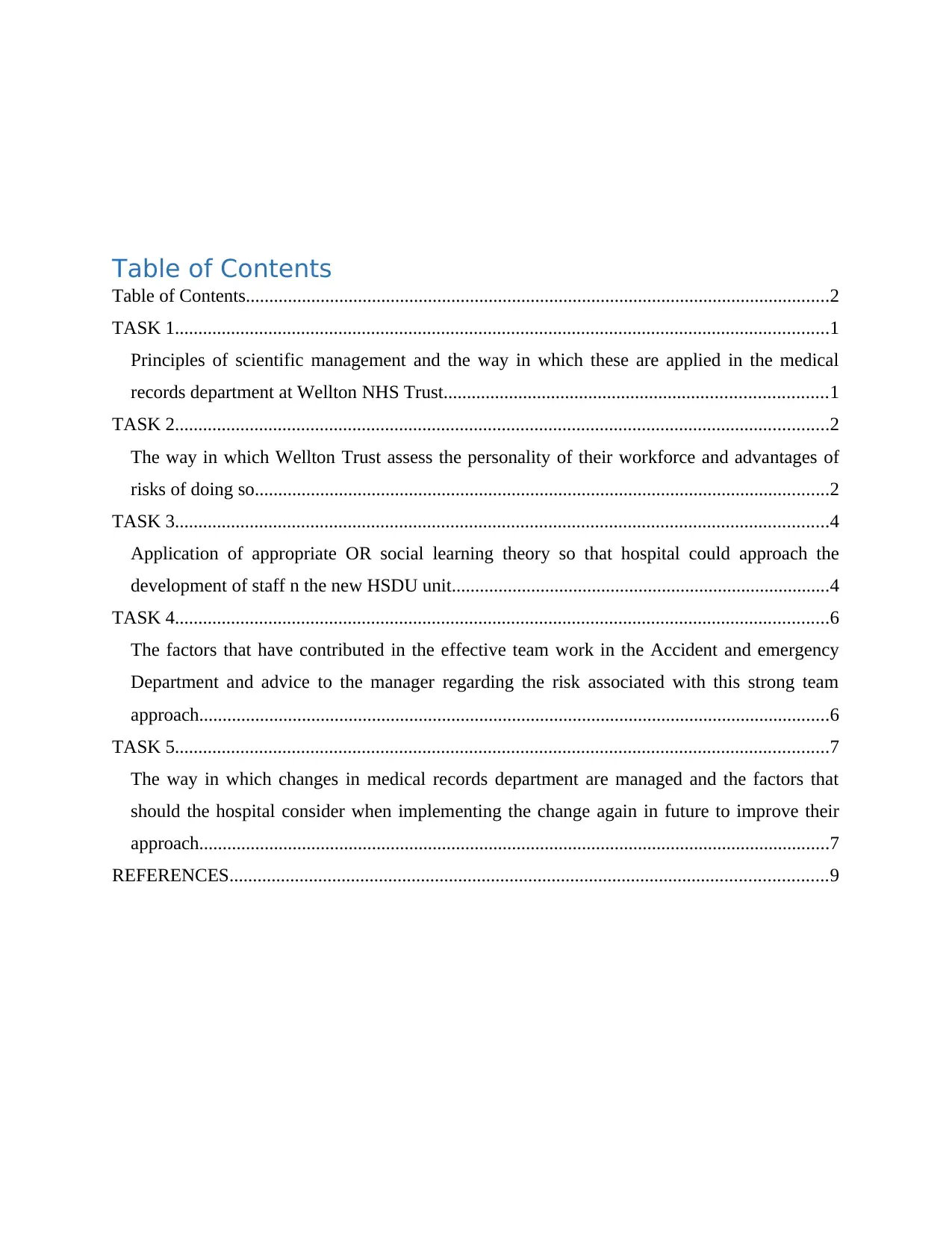
Table of Contents
Table of Contents.............................................................................................................................2
TASK 1............................................................................................................................................1
Principles of scientific management and the way in which these are applied in the medical
records department at Wellton NHS Trust..................................................................................1
TASK 2............................................................................................................................................2
The way in which Wellton Trust assess the personality of their workforce and advantages of
risks of doing so...........................................................................................................................2
TASK 3............................................................................................................................................4
Application of appropriate OR social learning theory so that hospital could approach the
development of staff n the new HSDU unit.................................................................................4
TASK 4............................................................................................................................................6
The factors that have contributed in the effective team work in the Accident and emergency
Department and advice to the manager regarding the risk associated with this strong team
approach.......................................................................................................................................6
TASK 5............................................................................................................................................7
The way in which changes in medical records department are managed and the factors that
should the hospital consider when implementing the change again in future to improve their
approach.......................................................................................................................................7
REFERENCES................................................................................................................................9
Table of Contents.............................................................................................................................2
TASK 1............................................................................................................................................1
Principles of scientific management and the way in which these are applied in the medical
records department at Wellton NHS Trust..................................................................................1
TASK 2............................................................................................................................................2
The way in which Wellton Trust assess the personality of their workforce and advantages of
risks of doing so...........................................................................................................................2
TASK 3............................................................................................................................................4
Application of appropriate OR social learning theory so that hospital could approach the
development of staff n the new HSDU unit.................................................................................4
TASK 4............................................................................................................................................6
The factors that have contributed in the effective team work in the Accident and emergency
Department and advice to the manager regarding the risk associated with this strong team
approach.......................................................................................................................................6
TASK 5............................................................................................................................................7
The way in which changes in medical records department are managed and the factors that
should the hospital consider when implementing the change again in future to improve their
approach.......................................................................................................................................7
REFERENCES................................................................................................................................9
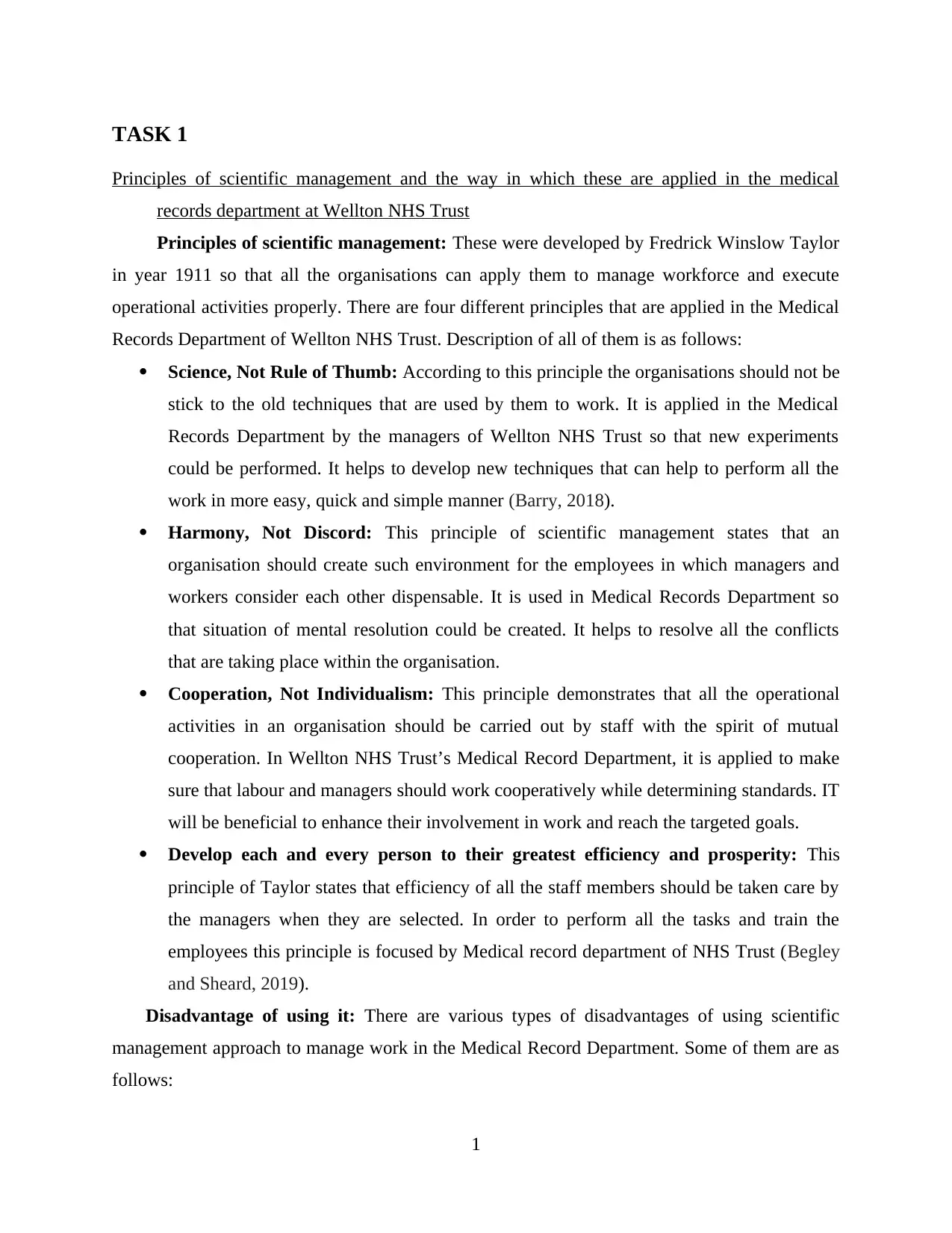
TASK 1
Principles of scientific management and the way in which these are applied in the medical
records department at Wellton NHS Trust
Principles of scientific management: These were developed by Fredrick Winslow Taylor
in year 1911 so that all the organisations can apply them to manage workforce and execute
operational activities properly. There are four different principles that are applied in the Medical
Records Department of Wellton NHS Trust. Description of all of them is as follows:
Science, Not Rule of Thumb: According to this principle the organisations should not be
stick to the old techniques that are used by them to work. It is applied in the Medical
Records Department by the managers of Wellton NHS Trust so that new experiments
could be performed. It helps to develop new techniques that can help to perform all the
work in more easy, quick and simple manner (Barry, 2018).
Harmony, Not Discord: This principle of scientific management states that an
organisation should create such environment for the employees in which managers and
workers consider each other dispensable. It is used in Medical Records Department so
that situation of mental resolution could be created. It helps to resolve all the conflicts
that are taking place within the organisation.
Cooperation, Not Individualism: This principle demonstrates that all the operational
activities in an organisation should be carried out by staff with the spirit of mutual
cooperation. In Wellton NHS Trust’s Medical Record Department, it is applied to make
sure that labour and managers should work cooperatively while determining standards. IT
will be beneficial to enhance their involvement in work and reach the targeted goals.
Develop each and every person to their greatest efficiency and prosperity: This
principle of Taylor states that efficiency of all the staff members should be taken care by
the managers when they are selected. In order to perform all the tasks and train the
employees this principle is focused by Medical record department of NHS Trust (Begley
and Sheard, 2019).
Disadvantage of using it: There are various types of disadvantages of using scientific
management approach to manage work in the Medical Record Department. Some of them are as
follows:
1
Principles of scientific management and the way in which these are applied in the medical
records department at Wellton NHS Trust
Principles of scientific management: These were developed by Fredrick Winslow Taylor
in year 1911 so that all the organisations can apply them to manage workforce and execute
operational activities properly. There are four different principles that are applied in the Medical
Records Department of Wellton NHS Trust. Description of all of them is as follows:
Science, Not Rule of Thumb: According to this principle the organisations should not be
stick to the old techniques that are used by them to work. It is applied in the Medical
Records Department by the managers of Wellton NHS Trust so that new experiments
could be performed. It helps to develop new techniques that can help to perform all the
work in more easy, quick and simple manner (Barry, 2018).
Harmony, Not Discord: This principle of scientific management states that an
organisation should create such environment for the employees in which managers and
workers consider each other dispensable. It is used in Medical Records Department so
that situation of mental resolution could be created. It helps to resolve all the conflicts
that are taking place within the organisation.
Cooperation, Not Individualism: This principle demonstrates that all the operational
activities in an organisation should be carried out by staff with the spirit of mutual
cooperation. In Wellton NHS Trust’s Medical Record Department, it is applied to make
sure that labour and managers should work cooperatively while determining standards. IT
will be beneficial to enhance their involvement in work and reach the targeted goals.
Develop each and every person to their greatest efficiency and prosperity: This
principle of Taylor states that efficiency of all the staff members should be taken care by
the managers when they are selected. In order to perform all the tasks and train the
employees this principle is focused by Medical record department of NHS Trust (Begley
and Sheard, 2019).
Disadvantage of using it: There are various types of disadvantages of using scientific
management approach to manage work in the Medical Record Department. Some of them are as
follows:
1
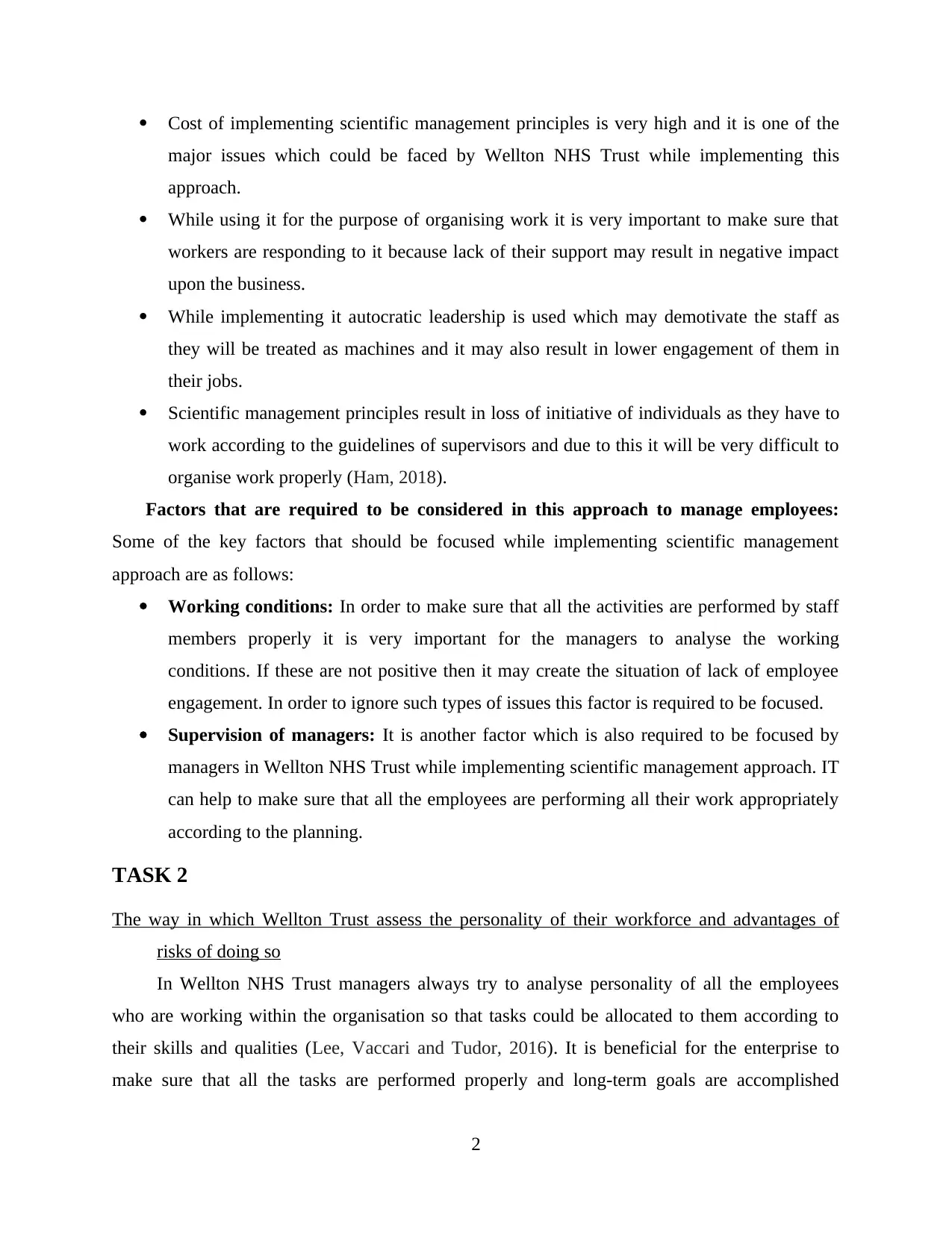
Cost of implementing scientific management principles is very high and it is one of the
major issues which could be faced by Wellton NHS Trust while implementing this
approach.
While using it for the purpose of organising work it is very important to make sure that
workers are responding to it because lack of their support may result in negative impact
upon the business.
While implementing it autocratic leadership is used which may demotivate the staff as
they will be treated as machines and it may also result in lower engagement of them in
their jobs.
Scientific management principles result in loss of initiative of individuals as they have to
work according to the guidelines of supervisors and due to this it will be very difficult to
organise work properly (Ham, 2018).
Factors that are required to be considered in this approach to manage employees:
Some of the key factors that should be focused while implementing scientific management
approach are as follows:
Working conditions: In order to make sure that all the activities are performed by staff
members properly it is very important for the managers to analyse the working
conditions. If these are not positive then it may create the situation of lack of employee
engagement. In order to ignore such types of issues this factor is required to be focused.
Supervision of managers: It is another factor which is also required to be focused by
managers in Wellton NHS Trust while implementing scientific management approach. IT
can help to make sure that all the employees are performing all their work appropriately
according to the planning.
TASK 2
The way in which Wellton Trust assess the personality of their workforce and advantages of
risks of doing so
In Wellton NHS Trust managers always try to analyse personality of all the employees
who are working within the organisation so that tasks could be allocated to them according to
their skills and qualities (Lee, Vaccari and Tudor, 2016). It is beneficial for the enterprise to
make sure that all the tasks are performed properly and long-term goals are accomplished
2
major issues which could be faced by Wellton NHS Trust while implementing this
approach.
While using it for the purpose of organising work it is very important to make sure that
workers are responding to it because lack of their support may result in negative impact
upon the business.
While implementing it autocratic leadership is used which may demotivate the staff as
they will be treated as machines and it may also result in lower engagement of them in
their jobs.
Scientific management principles result in loss of initiative of individuals as they have to
work according to the guidelines of supervisors and due to this it will be very difficult to
organise work properly (Ham, 2018).
Factors that are required to be considered in this approach to manage employees:
Some of the key factors that should be focused while implementing scientific management
approach are as follows:
Working conditions: In order to make sure that all the activities are performed by staff
members properly it is very important for the managers to analyse the working
conditions. If these are not positive then it may create the situation of lack of employee
engagement. In order to ignore such types of issues this factor is required to be focused.
Supervision of managers: It is another factor which is also required to be focused by
managers in Wellton NHS Trust while implementing scientific management approach. IT
can help to make sure that all the employees are performing all their work appropriately
according to the planning.
TASK 2
The way in which Wellton Trust assess the personality of their workforce and advantages of
risks of doing so
In Wellton NHS Trust managers always try to analyse personality of all the employees
who are working within the organisation so that tasks could be allocated to them according to
their skills and qualities (Lee, Vaccari and Tudor, 2016). It is beneficial for the enterprise to
make sure that all the tasks are performed properly and long-term goals are accomplished
2
Secure Best Marks with AI Grader
Need help grading? Try our AI Grader for instant feedback on your assignments.
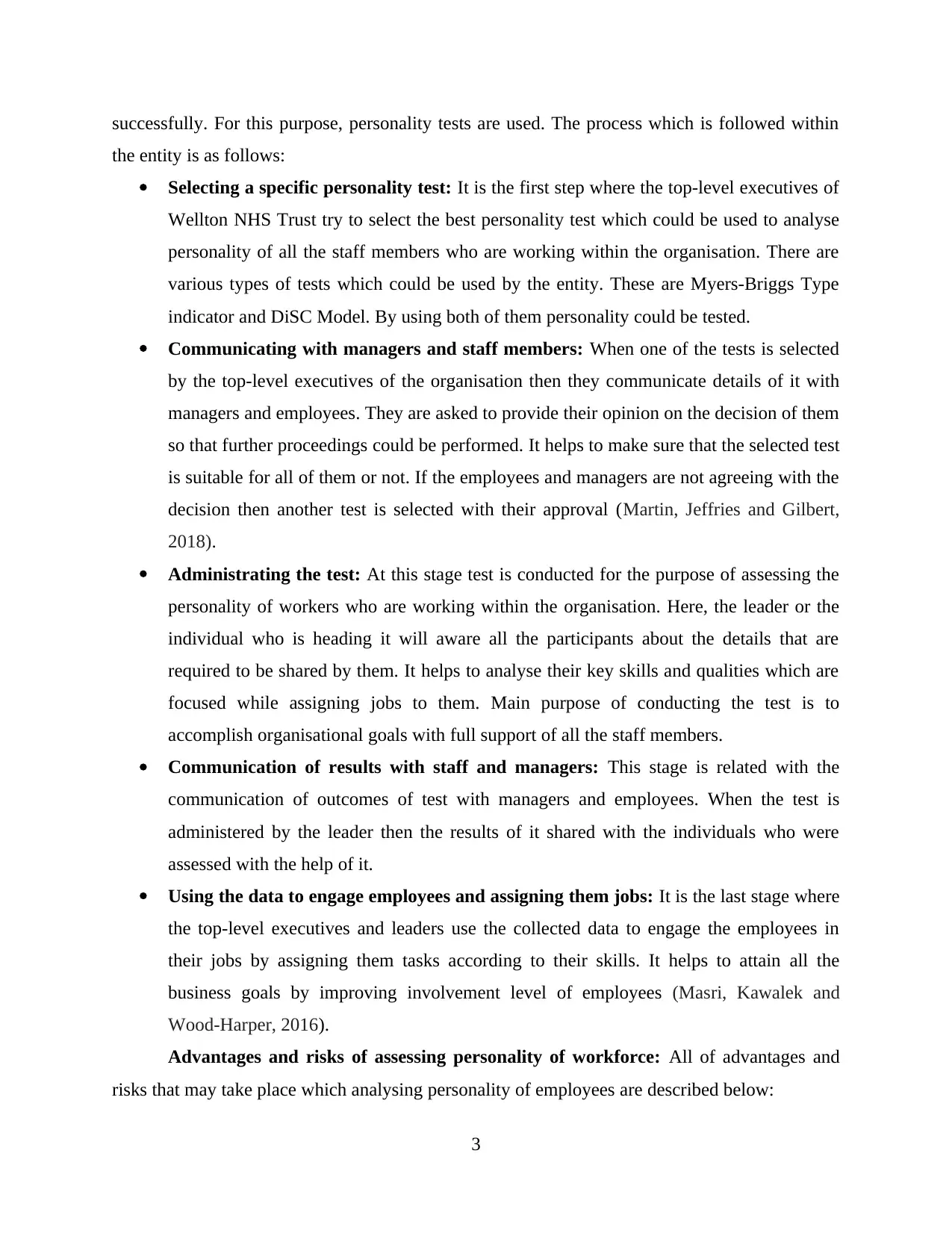
successfully. For this purpose, personality tests are used. The process which is followed within
the entity is as follows:
Selecting a specific personality test: It is the first step where the top-level executives of
Wellton NHS Trust try to select the best personality test which could be used to analyse
personality of all the staff members who are working within the organisation. There are
various types of tests which could be used by the entity. These are Myers-Briggs Type
indicator and DiSC Model. By using both of them personality could be tested.
Communicating with managers and staff members: When one of the tests is selected
by the top-level executives of the organisation then they communicate details of it with
managers and employees. They are asked to provide their opinion on the decision of them
so that further proceedings could be performed. It helps to make sure that the selected test
is suitable for all of them or not. If the employees and managers are not agreeing with the
decision then another test is selected with their approval (Martin, Jeffries and Gilbert,
2018).
Administrating the test: At this stage test is conducted for the purpose of assessing the
personality of workers who are working within the organisation. Here, the leader or the
individual who is heading it will aware all the participants about the details that are
required to be shared by them. It helps to analyse their key skills and qualities which are
focused while assigning jobs to them. Main purpose of conducting the test is to
accomplish organisational goals with full support of all the staff members.
Communication of results with staff and managers: This stage is related with the
communication of outcomes of test with managers and employees. When the test is
administered by the leader then the results of it shared with the individuals who were
assessed with the help of it.
Using the data to engage employees and assigning them jobs: It is the last stage where
the top-level executives and leaders use the collected data to engage the employees in
their jobs by assigning them tasks according to their skills. It helps to attain all the
business goals by improving involvement level of employees (Masri, Kawalek and
Wood-Harper, 2016).
Advantages and risks of assessing personality of workforce: All of advantages and
risks that may take place which analysing personality of employees are described below:
3
the entity is as follows:
Selecting a specific personality test: It is the first step where the top-level executives of
Wellton NHS Trust try to select the best personality test which could be used to analyse
personality of all the staff members who are working within the organisation. There are
various types of tests which could be used by the entity. These are Myers-Briggs Type
indicator and DiSC Model. By using both of them personality could be tested.
Communicating with managers and staff members: When one of the tests is selected
by the top-level executives of the organisation then they communicate details of it with
managers and employees. They are asked to provide their opinion on the decision of them
so that further proceedings could be performed. It helps to make sure that the selected test
is suitable for all of them or not. If the employees and managers are not agreeing with the
decision then another test is selected with their approval (Martin, Jeffries and Gilbert,
2018).
Administrating the test: At this stage test is conducted for the purpose of assessing the
personality of workers who are working within the organisation. Here, the leader or the
individual who is heading it will aware all the participants about the details that are
required to be shared by them. It helps to analyse their key skills and qualities which are
focused while assigning jobs to them. Main purpose of conducting the test is to
accomplish organisational goals with full support of all the staff members.
Communication of results with staff and managers: This stage is related with the
communication of outcomes of test with managers and employees. When the test is
administered by the leader then the results of it shared with the individuals who were
assessed with the help of it.
Using the data to engage employees and assigning them jobs: It is the last stage where
the top-level executives and leaders use the collected data to engage the employees in
their jobs by assigning them tasks according to their skills. It helps to attain all the
business goals by improving involvement level of employees (Masri, Kawalek and
Wood-Harper, 2016).
Advantages and risks of assessing personality of workforce: All of advantages and
risks that may take place which analysing personality of employees are described below:
3
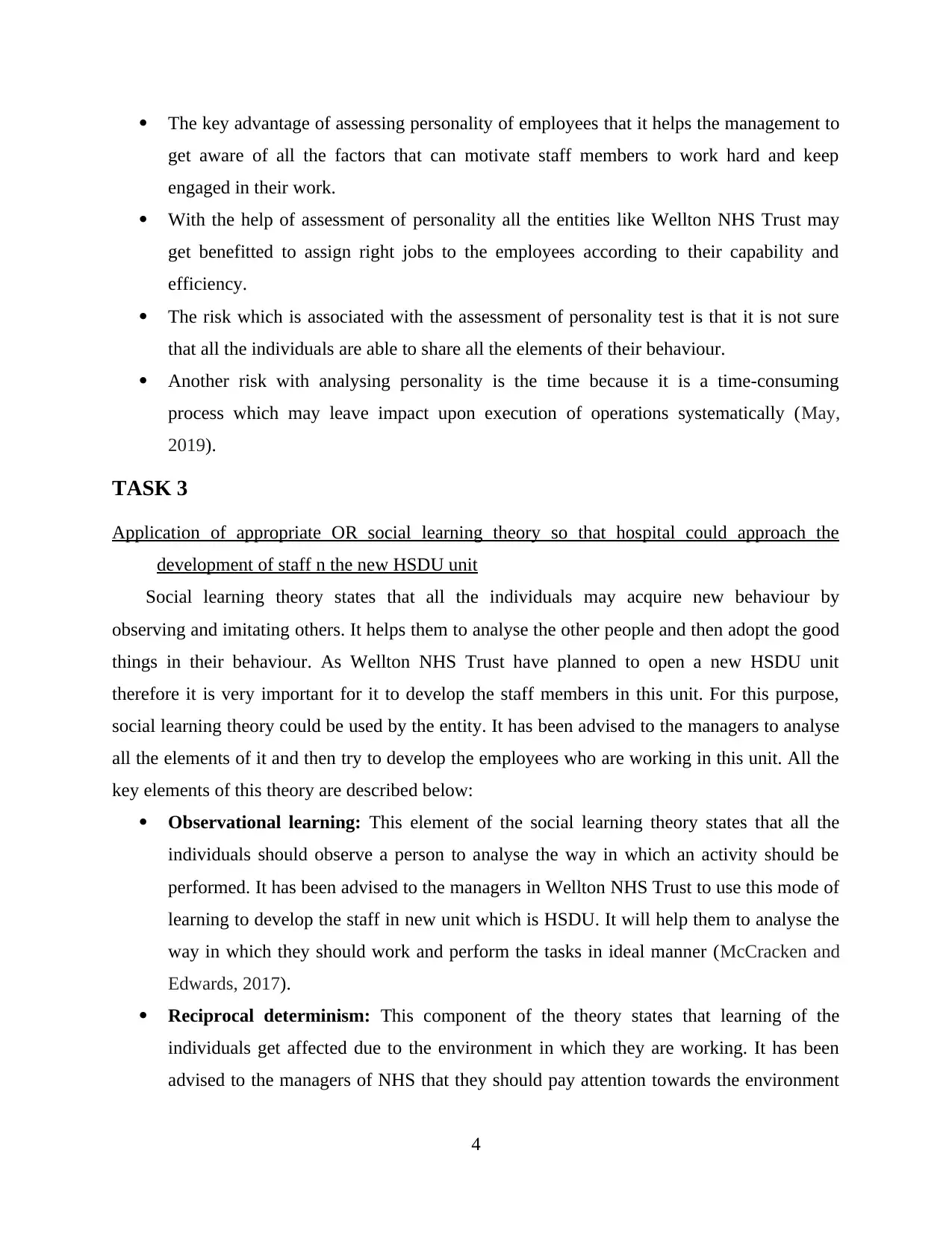
The key advantage of assessing personality of employees that it helps the management to
get aware of all the factors that can motivate staff members to work hard and keep
engaged in their work.
With the help of assessment of personality all the entities like Wellton NHS Trust may
get benefitted to assign right jobs to the employees according to their capability and
efficiency.
The risk which is associated with the assessment of personality test is that it is not sure
that all the individuals are able to share all the elements of their behaviour.
Another risk with analysing personality is the time because it is a time-consuming
process which may leave impact upon execution of operations systematically (May,
2019).
TASK 3
Application of appropriate OR social learning theory so that hospital could approach the
development of staff n the new HSDU unit
Social learning theory states that all the individuals may acquire new behaviour by
observing and imitating others. It helps them to analyse the other people and then adopt the good
things in their behaviour. As Wellton NHS Trust have planned to open a new HSDU unit
therefore it is very important for it to develop the staff members in this unit. For this purpose,
social learning theory could be used by the entity. It has been advised to the managers to analyse
all the elements of it and then try to develop the employees who are working in this unit. All the
key elements of this theory are described below:
Observational learning: This element of the social learning theory states that all the
individuals should observe a person to analyse the way in which an activity should be
performed. It has been advised to the managers in Wellton NHS Trust to use this mode of
learning to develop the staff in new unit which is HSDU. It will help them to analyse the
way in which they should work and perform the tasks in ideal manner (McCracken and
Edwards, 2017).
Reciprocal determinism: This component of the theory states that learning of the
individuals get affected due to the environment in which they are working. It has been
advised to the managers of NHS that they should pay attention towards the environment
4
get aware of all the factors that can motivate staff members to work hard and keep
engaged in their work.
With the help of assessment of personality all the entities like Wellton NHS Trust may
get benefitted to assign right jobs to the employees according to their capability and
efficiency.
The risk which is associated with the assessment of personality test is that it is not sure
that all the individuals are able to share all the elements of their behaviour.
Another risk with analysing personality is the time because it is a time-consuming
process which may leave impact upon execution of operations systematically (May,
2019).
TASK 3
Application of appropriate OR social learning theory so that hospital could approach the
development of staff n the new HSDU unit
Social learning theory states that all the individuals may acquire new behaviour by
observing and imitating others. It helps them to analyse the other people and then adopt the good
things in their behaviour. As Wellton NHS Trust have planned to open a new HSDU unit
therefore it is very important for it to develop the staff members in this unit. For this purpose,
social learning theory could be used by the entity. It has been advised to the managers to analyse
all the elements of it and then try to develop the employees who are working in this unit. All the
key elements of this theory are described below:
Observational learning: This element of the social learning theory states that all the
individuals should observe a person to analyse the way in which an activity should be
performed. It has been advised to the managers in Wellton NHS Trust to use this mode of
learning to develop the staff in new unit which is HSDU. It will help them to analyse the
way in which they should work and perform the tasks in ideal manner (McCracken and
Edwards, 2017).
Reciprocal determinism: This component of the theory states that learning of the
individuals get affected due to the environment in which they are working. It has been
advised to the managers of NHS that they should pay attention towards the environment
4
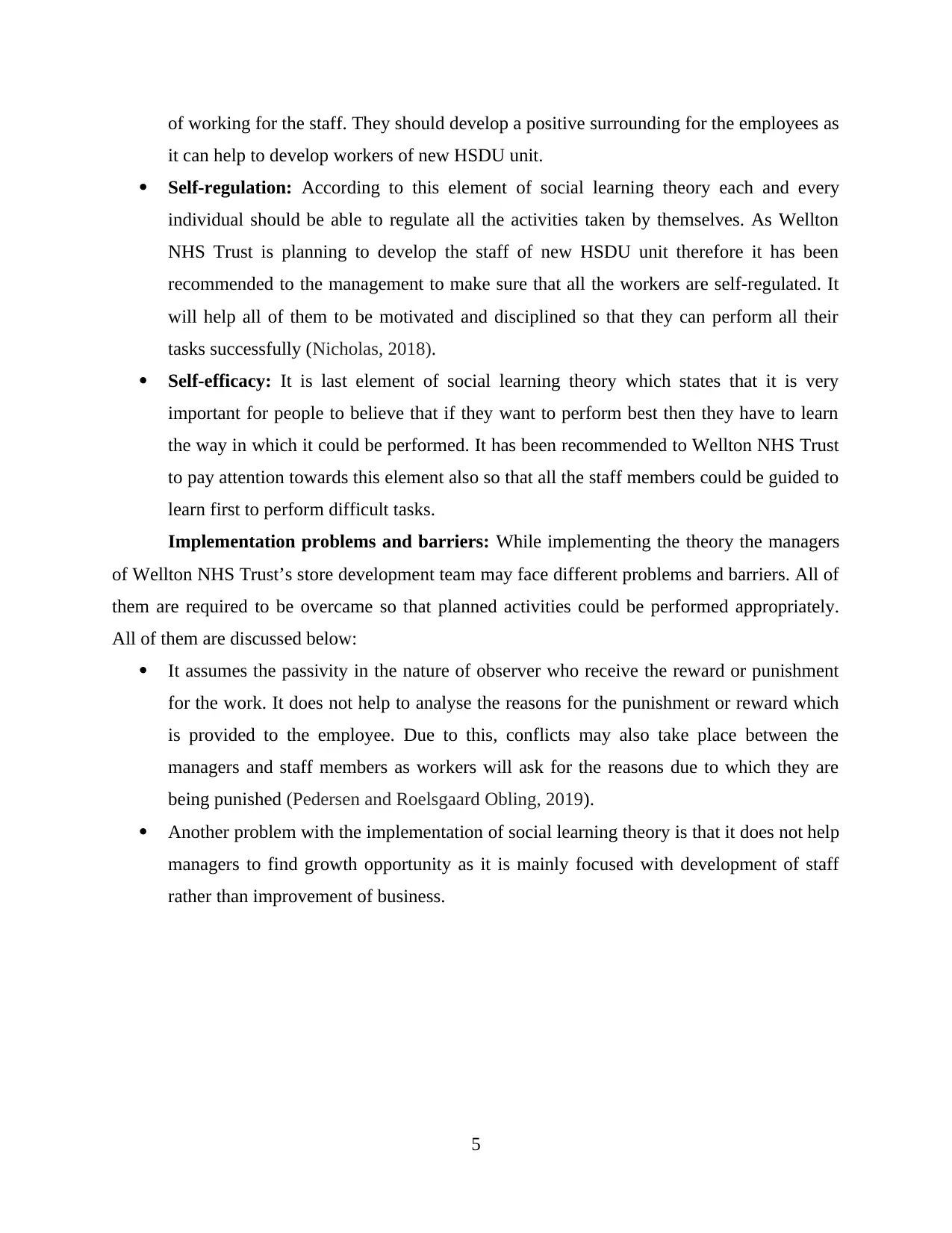
of working for the staff. They should develop a positive surrounding for the employees as
it can help to develop workers of new HSDU unit.
Self-regulation: According to this element of social learning theory each and every
individual should be able to regulate all the activities taken by themselves. As Wellton
NHS Trust is planning to develop the staff of new HSDU unit therefore it has been
recommended to the management to make sure that all the workers are self-regulated. It
will help all of them to be motivated and disciplined so that they can perform all their
tasks successfully (Nicholas, 2018).
Self-efficacy: It is last element of social learning theory which states that it is very
important for people to believe that if they want to perform best then they have to learn
the way in which it could be performed. It has been recommended to Wellton NHS Trust
to pay attention towards this element also so that all the staff members could be guided to
learn first to perform difficult tasks.
Implementation problems and barriers: While implementing the theory the managers
of Wellton NHS Trust’s store development team may face different problems and barriers. All of
them are required to be overcame so that planned activities could be performed appropriately.
All of them are discussed below:
It assumes the passivity in the nature of observer who receive the reward or punishment
for the work. It does not help to analyse the reasons for the punishment or reward which
is provided to the employee. Due to this, conflicts may also take place between the
managers and staff members as workers will ask for the reasons due to which they are
being punished (Pedersen and Roelsgaard Obling, 2019).
Another problem with the implementation of social learning theory is that it does not help
managers to find growth opportunity as it is mainly focused with development of staff
rather than improvement of business.
5
it can help to develop workers of new HSDU unit.
Self-regulation: According to this element of social learning theory each and every
individual should be able to regulate all the activities taken by themselves. As Wellton
NHS Trust is planning to develop the staff of new HSDU unit therefore it has been
recommended to the management to make sure that all the workers are self-regulated. It
will help all of them to be motivated and disciplined so that they can perform all their
tasks successfully (Nicholas, 2018).
Self-efficacy: It is last element of social learning theory which states that it is very
important for people to believe that if they want to perform best then they have to learn
the way in which it could be performed. It has been recommended to Wellton NHS Trust
to pay attention towards this element also so that all the staff members could be guided to
learn first to perform difficult tasks.
Implementation problems and barriers: While implementing the theory the managers
of Wellton NHS Trust’s store development team may face different problems and barriers. All of
them are required to be overcame so that planned activities could be performed appropriately.
All of them are discussed below:
It assumes the passivity in the nature of observer who receive the reward or punishment
for the work. It does not help to analyse the reasons for the punishment or reward which
is provided to the employee. Due to this, conflicts may also take place between the
managers and staff members as workers will ask for the reasons due to which they are
being punished (Pedersen and Roelsgaard Obling, 2019).
Another problem with the implementation of social learning theory is that it does not help
managers to find growth opportunity as it is mainly focused with development of staff
rather than improvement of business.
5
Paraphrase This Document
Need a fresh take? Get an instant paraphrase of this document with our AI Paraphraser
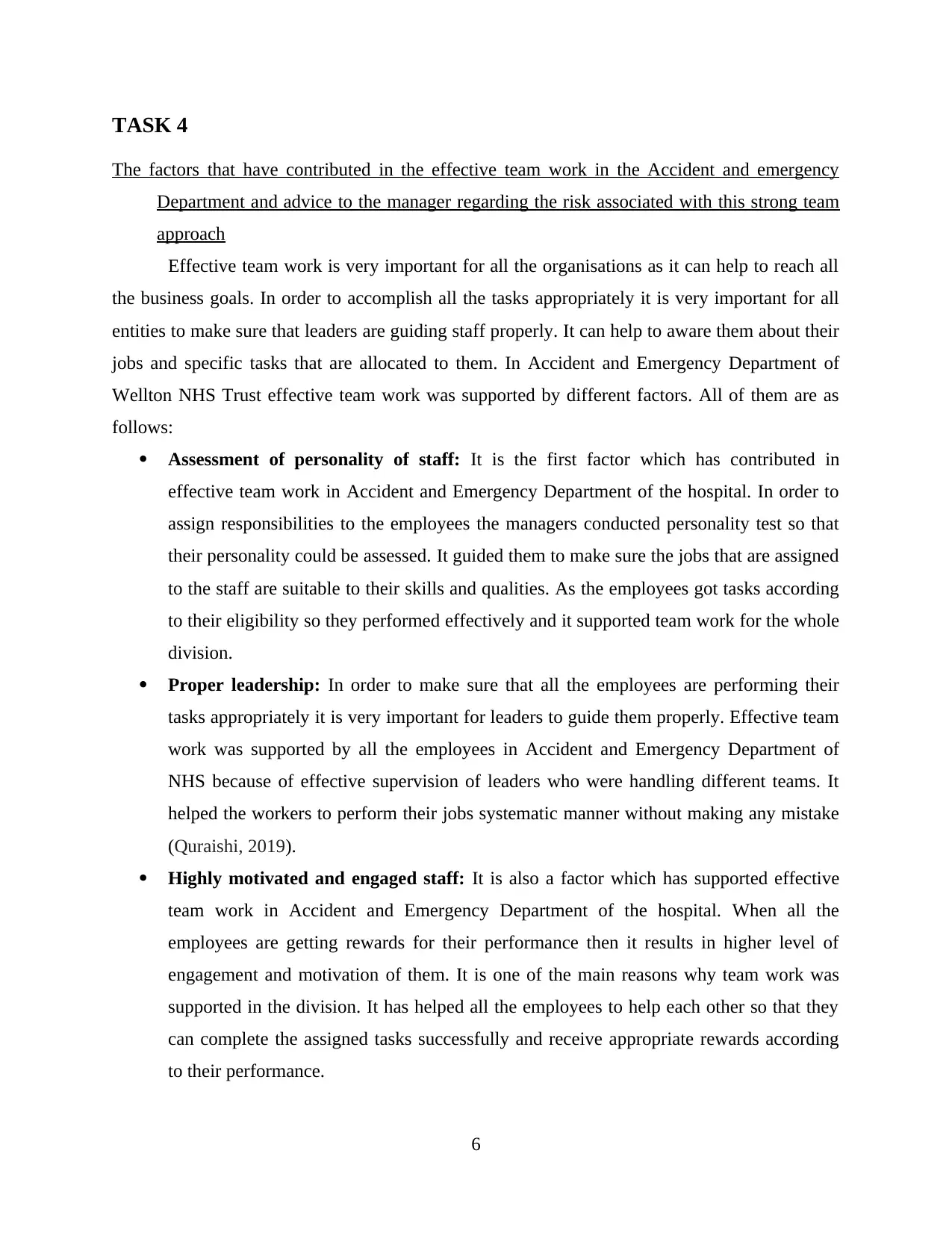
TASK 4
The factors that have contributed in the effective team work in the Accident and emergency
Department and advice to the manager regarding the risk associated with this strong team
approach
Effective team work is very important for all the organisations as it can help to reach all
the business goals. In order to accomplish all the tasks appropriately it is very important for all
entities to make sure that leaders are guiding staff properly. It can help to aware them about their
jobs and specific tasks that are allocated to them. In Accident and Emergency Department of
Wellton NHS Trust effective team work was supported by different factors. All of them are as
follows:
Assessment of personality of staff: It is the first factor which has contributed in
effective team work in Accident and Emergency Department of the hospital. In order to
assign responsibilities to the employees the managers conducted personality test so that
their personality could be assessed. It guided them to make sure the jobs that are assigned
to the staff are suitable to their skills and qualities. As the employees got tasks according
to their eligibility so they performed effectively and it supported team work for the whole
division.
Proper leadership: In order to make sure that all the employees are performing their
tasks appropriately it is very important for leaders to guide them properly. Effective team
work was supported by all the employees in Accident and Emergency Department of
NHS because of effective supervision of leaders who were handling different teams. It
helped the workers to perform their jobs systematic manner without making any mistake
(Quraishi, 2019).
Highly motivated and engaged staff: It is also a factor which has supported effective
team work in Accident and Emergency Department of the hospital. When all the
employees are getting rewards for their performance then it results in higher level of
engagement and motivation of them. It is one of the main reasons why team work was
supported in the division. It has helped all the employees to help each other so that they
can complete the assigned tasks successfully and receive appropriate rewards according
to their performance.
6
The factors that have contributed in the effective team work in the Accident and emergency
Department and advice to the manager regarding the risk associated with this strong team
approach
Effective team work is very important for all the organisations as it can help to reach all
the business goals. In order to accomplish all the tasks appropriately it is very important for all
entities to make sure that leaders are guiding staff properly. It can help to aware them about their
jobs and specific tasks that are allocated to them. In Accident and Emergency Department of
Wellton NHS Trust effective team work was supported by different factors. All of them are as
follows:
Assessment of personality of staff: It is the first factor which has contributed in
effective team work in Accident and Emergency Department of the hospital. In order to
assign responsibilities to the employees the managers conducted personality test so that
their personality could be assessed. It guided them to make sure the jobs that are assigned
to the staff are suitable to their skills and qualities. As the employees got tasks according
to their eligibility so they performed effectively and it supported team work for the whole
division.
Proper leadership: In order to make sure that all the employees are performing their
tasks appropriately it is very important for leaders to guide them properly. Effective team
work was supported by all the employees in Accident and Emergency Department of
NHS because of effective supervision of leaders who were handling different teams. It
helped the workers to perform their jobs systematic manner without making any mistake
(Quraishi, 2019).
Highly motivated and engaged staff: It is also a factor which has supported effective
team work in Accident and Emergency Department of the hospital. When all the
employees are getting rewards for their performance then it results in higher level of
engagement and motivation of them. It is one of the main reasons why team work was
supported in the division. It has helped all the employees to help each other so that they
can complete the assigned tasks successfully and receive appropriate rewards according
to their performance.
6
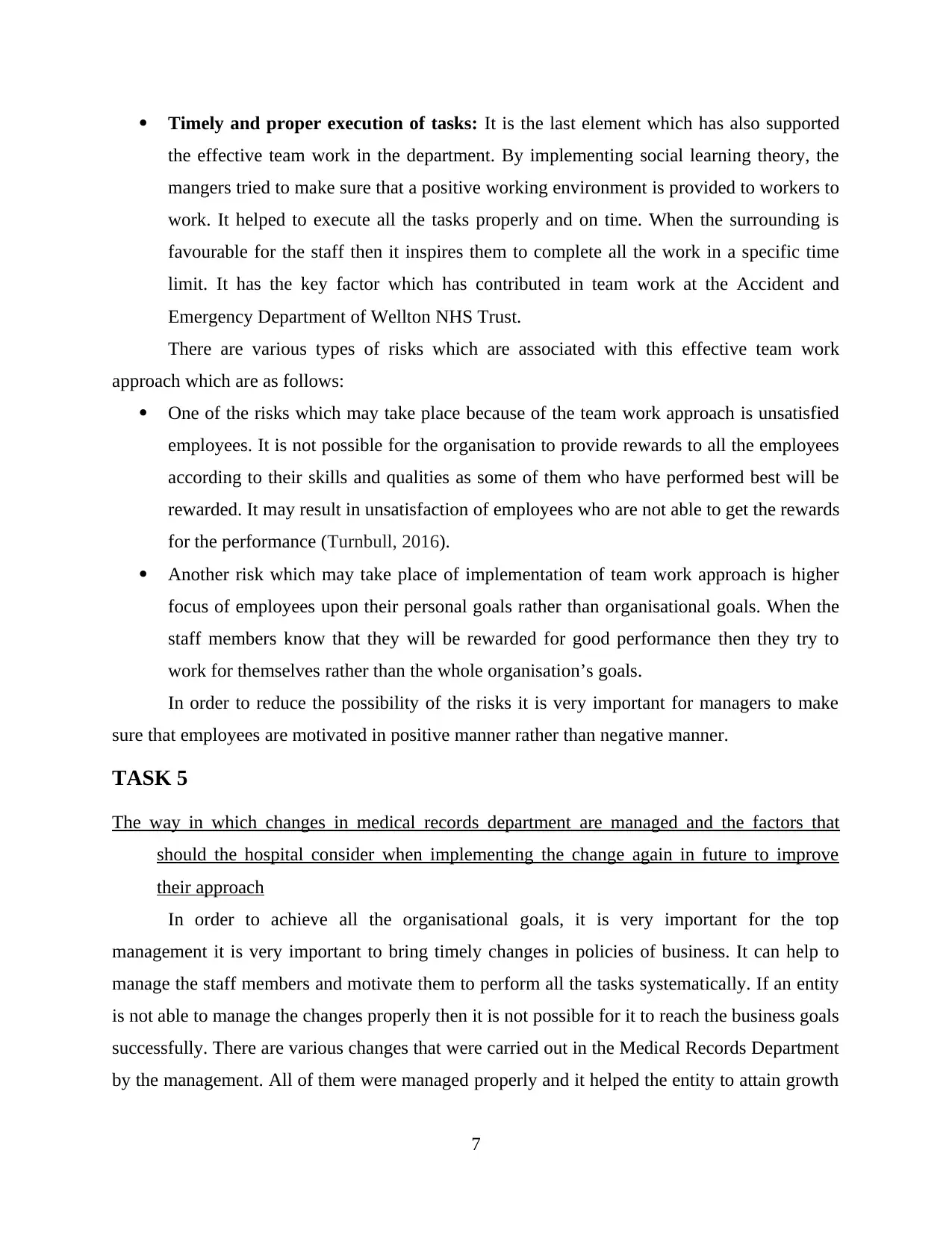
Timely and proper execution of tasks: It is the last element which has also supported
the effective team work in the department. By implementing social learning theory, the
mangers tried to make sure that a positive working environment is provided to workers to
work. It helped to execute all the tasks properly and on time. When the surrounding is
favourable for the staff then it inspires them to complete all the work in a specific time
limit. It has the key factor which has contributed in team work at the Accident and
Emergency Department of Wellton NHS Trust.
There are various types of risks which are associated with this effective team work
approach which are as follows:
One of the risks which may take place because of the team work approach is unsatisfied
employees. It is not possible for the organisation to provide rewards to all the employees
according to their skills and qualities as some of them who have performed best will be
rewarded. It may result in unsatisfaction of employees who are not able to get the rewards
for the performance (Turnbull, 2016).
Another risk which may take place of implementation of team work approach is higher
focus of employees upon their personal goals rather than organisational goals. When the
staff members know that they will be rewarded for good performance then they try to
work for themselves rather than the whole organisation’s goals.
In order to reduce the possibility of the risks it is very important for managers to make
sure that employees are motivated in positive manner rather than negative manner.
TASK 5
The way in which changes in medical records department are managed and the factors that
should the hospital consider when implementing the change again in future to improve
their approach
In order to achieve all the organisational goals, it is very important for the top
management it is very important to bring timely changes in policies of business. It can help to
manage the staff members and motivate them to perform all the tasks systematically. If an entity
is not able to manage the changes properly then it is not possible for it to reach the business goals
successfully. There are various changes that were carried out in the Medical Records Department
by the management. All of them were managed properly and it helped the entity to attain growth
7
the effective team work in the department. By implementing social learning theory, the
mangers tried to make sure that a positive working environment is provided to workers to
work. It helped to execute all the tasks properly and on time. When the surrounding is
favourable for the staff then it inspires them to complete all the work in a specific time
limit. It has the key factor which has contributed in team work at the Accident and
Emergency Department of Wellton NHS Trust.
There are various types of risks which are associated with this effective team work
approach which are as follows:
One of the risks which may take place because of the team work approach is unsatisfied
employees. It is not possible for the organisation to provide rewards to all the employees
according to their skills and qualities as some of them who have performed best will be
rewarded. It may result in unsatisfaction of employees who are not able to get the rewards
for the performance (Turnbull, 2016).
Another risk which may take place of implementation of team work approach is higher
focus of employees upon their personal goals rather than organisational goals. When the
staff members know that they will be rewarded for good performance then they try to
work for themselves rather than the whole organisation’s goals.
In order to reduce the possibility of the risks it is very important for managers to make
sure that employees are motivated in positive manner rather than negative manner.
TASK 5
The way in which changes in medical records department are managed and the factors that
should the hospital consider when implementing the change again in future to improve
their approach
In order to achieve all the organisational goals, it is very important for the top
management it is very important to bring timely changes in policies of business. It can help to
manage the staff members and motivate them to perform all the tasks systematically. If an entity
is not able to manage the changes properly then it is not possible for it to reach the business goals
successfully. There are various changes that were carried out in the Medical Records Department
by the management. All of them were managed properly and it helped the entity to attain growth
7
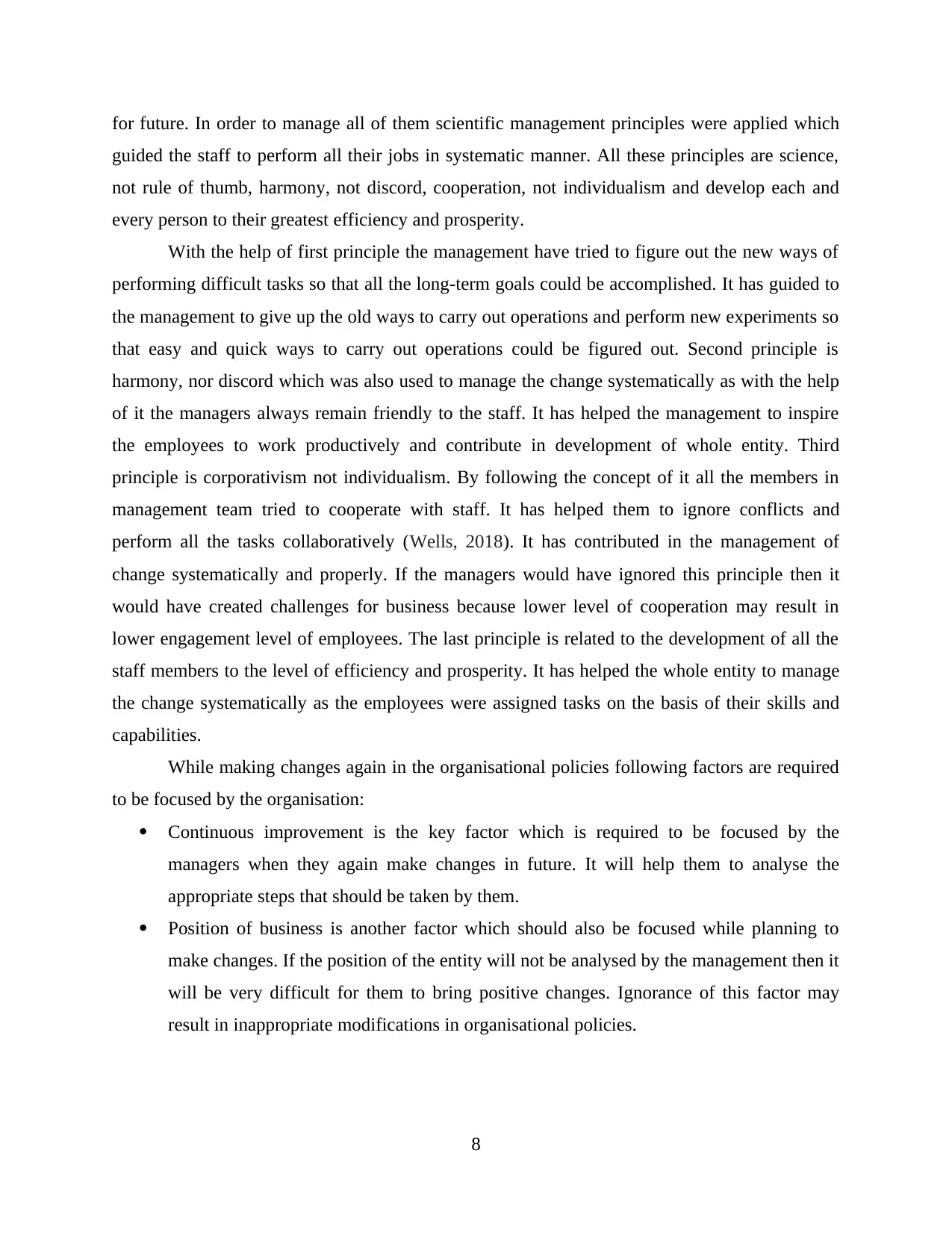
for future. In order to manage all of them scientific management principles were applied which
guided the staff to perform all their jobs in systematic manner. All these principles are science,
not rule of thumb, harmony, not discord, cooperation, not individualism and develop each and
every person to their greatest efficiency and prosperity.
With the help of first principle the management have tried to figure out the new ways of
performing difficult tasks so that all the long-term goals could be accomplished. It has guided to
the management to give up the old ways to carry out operations and perform new experiments so
that easy and quick ways to carry out operations could be figured out. Second principle is
harmony, nor discord which was also used to manage the change systematically as with the help
of it the managers always remain friendly to the staff. It has helped the management to inspire
the employees to work productively and contribute in development of whole entity. Third
principle is corporativism not individualism. By following the concept of it all the members in
management team tried to cooperate with staff. It has helped them to ignore conflicts and
perform all the tasks collaboratively (Wells, 2018). It has contributed in the management of
change systematically and properly. If the managers would have ignored this principle then it
would have created challenges for business because lower level of cooperation may result in
lower engagement level of employees. The last principle is related to the development of all the
staff members to the level of efficiency and prosperity. It has helped the whole entity to manage
the change systematically as the employees were assigned tasks on the basis of their skills and
capabilities.
While making changes again in the organisational policies following factors are required
to be focused by the organisation:
Continuous improvement is the key factor which is required to be focused by the
managers when they again make changes in future. It will help them to analyse the
appropriate steps that should be taken by them.
Position of business is another factor which should also be focused while planning to
make changes. If the position of the entity will not be analysed by the management then it
will be very difficult for them to bring positive changes. Ignorance of this factor may
result in inappropriate modifications in organisational policies.
8
guided the staff to perform all their jobs in systematic manner. All these principles are science,
not rule of thumb, harmony, not discord, cooperation, not individualism and develop each and
every person to their greatest efficiency and prosperity.
With the help of first principle the management have tried to figure out the new ways of
performing difficult tasks so that all the long-term goals could be accomplished. It has guided to
the management to give up the old ways to carry out operations and perform new experiments so
that easy and quick ways to carry out operations could be figured out. Second principle is
harmony, nor discord which was also used to manage the change systematically as with the help
of it the managers always remain friendly to the staff. It has helped the management to inspire
the employees to work productively and contribute in development of whole entity. Third
principle is corporativism not individualism. By following the concept of it all the members in
management team tried to cooperate with staff. It has helped them to ignore conflicts and
perform all the tasks collaboratively (Wells, 2018). It has contributed in the management of
change systematically and properly. If the managers would have ignored this principle then it
would have created challenges for business because lower level of cooperation may result in
lower engagement level of employees. The last principle is related to the development of all the
staff members to the level of efficiency and prosperity. It has helped the whole entity to manage
the change systematically as the employees were assigned tasks on the basis of their skills and
capabilities.
While making changes again in the organisational policies following factors are required
to be focused by the organisation:
Continuous improvement is the key factor which is required to be focused by the
managers when they again make changes in future. It will help them to analyse the
appropriate steps that should be taken by them.
Position of business is another factor which should also be focused while planning to
make changes. If the position of the entity will not be analysed by the management then it
will be very difficult for them to bring positive changes. Ignorance of this factor may
result in inappropriate modifications in organisational policies.
8
Secure Best Marks with AI Grader
Need help grading? Try our AI Grader for instant feedback on your assignments.
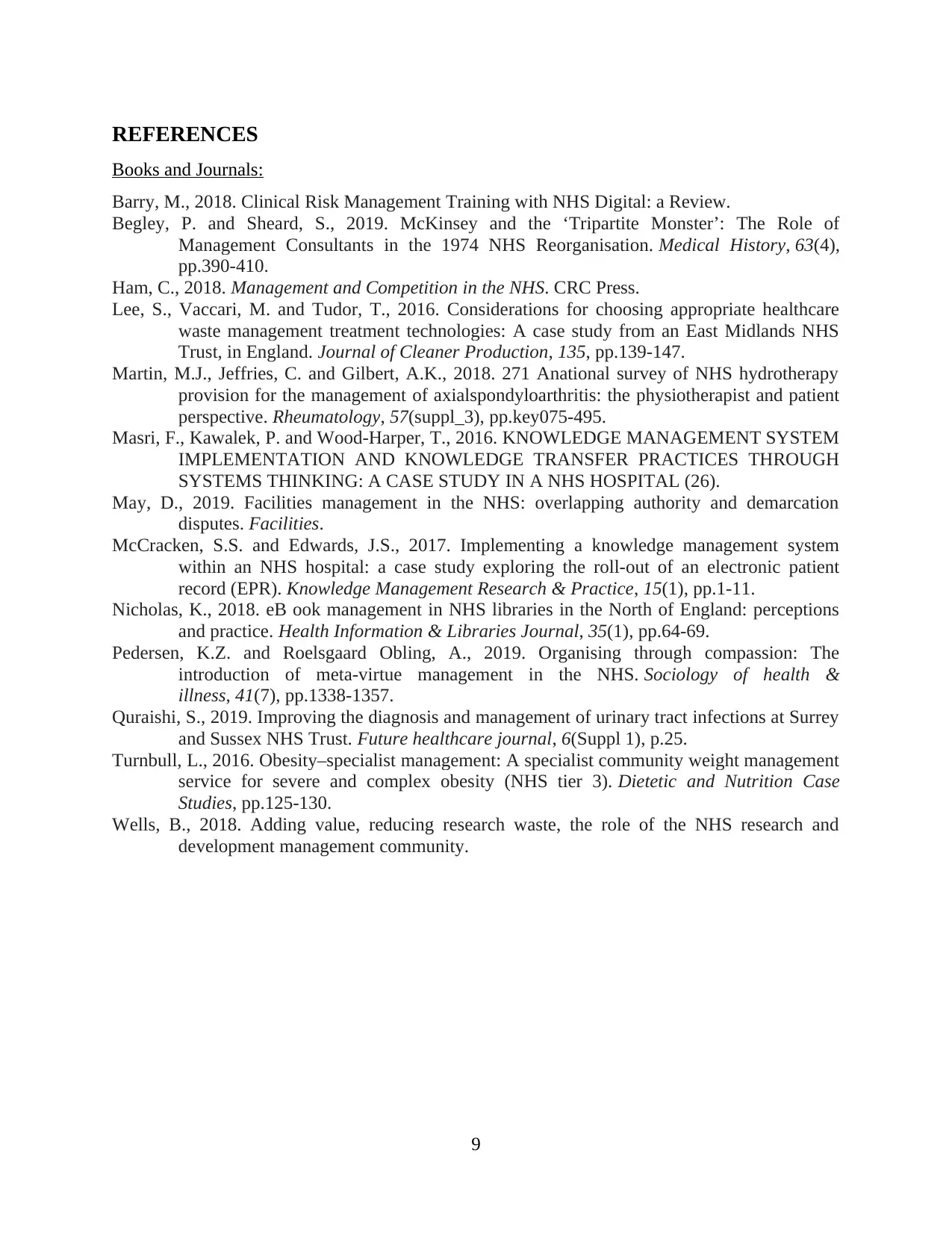
REFERENCES
Books and Journals:
Barry, M., 2018. Clinical Risk Management Training with NHS Digital: a Review.
Begley, P. and Sheard, S., 2019. McKinsey and the ‘Tripartite Monster’: The Role of
Management Consultants in the 1974 NHS Reorganisation. Medical History, 63(4),
pp.390-410.
Ham, C., 2018. Management and Competition in the NHS. CRC Press.
Lee, S., Vaccari, M. and Tudor, T., 2016. Considerations for choosing appropriate healthcare
waste management treatment technologies: A case study from an East Midlands NHS
Trust, in England. Journal of Cleaner Production, 135, pp.139-147.
Martin, M.J., Jeffries, C. and Gilbert, A.K., 2018. 271 Anational survey of NHS hydrotherapy
provision for the management of axialspondyloarthritis: the physiotherapist and patient
perspective. Rheumatology, 57(suppl_3), pp.key075-495.
Masri, F., Kawalek, P. and Wood-Harper, T., 2016. KNOWLEDGE MANAGEMENT SYSTEM
IMPLEMENTATION AND KNOWLEDGE TRANSFER PRACTICES THROUGH
SYSTEMS THINKING: A CASE STUDY IN A NHS HOSPITAL (26).
May, D., 2019. Facilities management in the NHS: overlapping authority and demarcation
disputes. Facilities.
McCracken, S.S. and Edwards, J.S., 2017. Implementing a knowledge management system
within an NHS hospital: a case study exploring the roll-out of an electronic patient
record (EPR). Knowledge Management Research & Practice, 15(1), pp.1-11.
Nicholas, K., 2018. eB ook management in NHS libraries in the North of England: perceptions
and practice. Health Information & Libraries Journal, 35(1), pp.64-69.
Pedersen, K.Z. and Roelsgaard Obling, A., 2019. Organising through compassion: The
introduction of meta‐virtue management in the NHS. Sociology of health &
illness, 41(7), pp.1338-1357.
Quraishi, S., 2019. Improving the diagnosis and management of urinary tract infections at Surrey
and Sussex NHS Trust. Future healthcare journal, 6(Suppl 1), p.25.
Turnbull, L., 2016. Obesity–specialist management: A specialist community weight management
service for severe and complex obesity (NHS tier 3). Dietetic and Nutrition Case
Studies, pp.125-130.
Wells, B., 2018. Adding value, reducing research waste, the role of the NHS research and
development management community.
9
Books and Journals:
Barry, M., 2018. Clinical Risk Management Training with NHS Digital: a Review.
Begley, P. and Sheard, S., 2019. McKinsey and the ‘Tripartite Monster’: The Role of
Management Consultants in the 1974 NHS Reorganisation. Medical History, 63(4),
pp.390-410.
Ham, C., 2018. Management and Competition in the NHS. CRC Press.
Lee, S., Vaccari, M. and Tudor, T., 2016. Considerations for choosing appropriate healthcare
waste management treatment technologies: A case study from an East Midlands NHS
Trust, in England. Journal of Cleaner Production, 135, pp.139-147.
Martin, M.J., Jeffries, C. and Gilbert, A.K., 2018. 271 Anational survey of NHS hydrotherapy
provision for the management of axialspondyloarthritis: the physiotherapist and patient
perspective. Rheumatology, 57(suppl_3), pp.key075-495.
Masri, F., Kawalek, P. and Wood-Harper, T., 2016. KNOWLEDGE MANAGEMENT SYSTEM
IMPLEMENTATION AND KNOWLEDGE TRANSFER PRACTICES THROUGH
SYSTEMS THINKING: A CASE STUDY IN A NHS HOSPITAL (26).
May, D., 2019. Facilities management in the NHS: overlapping authority and demarcation
disputes. Facilities.
McCracken, S.S. and Edwards, J.S., 2017. Implementing a knowledge management system
within an NHS hospital: a case study exploring the roll-out of an electronic patient
record (EPR). Knowledge Management Research & Practice, 15(1), pp.1-11.
Nicholas, K., 2018. eB ook management in NHS libraries in the North of England: perceptions
and practice. Health Information & Libraries Journal, 35(1), pp.64-69.
Pedersen, K.Z. and Roelsgaard Obling, A., 2019. Organising through compassion: The
introduction of meta‐virtue management in the NHS. Sociology of health &
illness, 41(7), pp.1338-1357.
Quraishi, S., 2019. Improving the diagnosis and management of urinary tract infections at Surrey
and Sussex NHS Trust. Future healthcare journal, 6(Suppl 1), p.25.
Turnbull, L., 2016. Obesity–specialist management: A specialist community weight management
service for severe and complex obesity (NHS tier 3). Dietetic and Nutrition Case
Studies, pp.125-130.
Wells, B., 2018. Adding value, reducing research waste, the role of the NHS research and
development management community.
9
1 out of 11
Related Documents
Your All-in-One AI-Powered Toolkit for Academic Success.
+13062052269
info@desklib.com
Available 24*7 on WhatsApp / Email
![[object Object]](/_next/static/media/star-bottom.7253800d.svg)
Unlock your academic potential
© 2024 | Zucol Services PVT LTD | All rights reserved.





